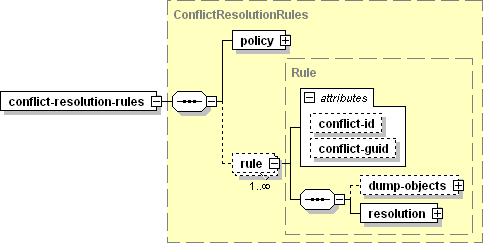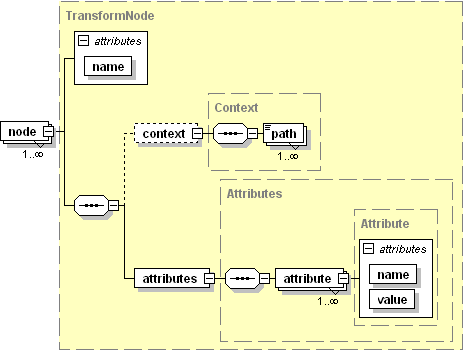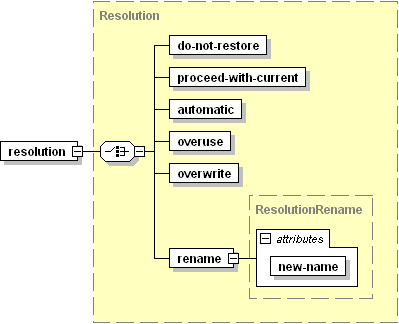The file should be structured as follows.

-
conflict-resolution-rules
Required, document root element.-
policy
Required, contains the policies descriptions. For details on the
node format, refer to the section Resolutions Description Format:
Policies.
The element content must reflect the conditions under which the
conflicts were detected. -
ruleOptional, contains a rule description.Must be present in the document when defining conflict
resolution rules. Should be present as many times as the number
of unresolved conflicts.At least one of the attributes (
conflict-id,
conflict-guid) MUST be present.-
conflict-id
Optional, defines ID of the conflict being resolved. Value is
integer.
The ID should be obtained from the conflict description
returned bypleskrestore(the
“/conflicts-description/conflict[@id]” attribute value) -
conflict-guid
Optional, defines global ID of the conflict being resolved.
Value is string.
The GUID should be obtained from the conflict description
returned bypleskrestore(the
“/conflicts-description/conflict[@guid]” attribute value).
If omitted, the conflict for resolution is identified by ID. -
dump-objects
Optional, holds a collection of descriptions of backup objects
involved into the conflict and taking the same conflict
resolution
Must be present in the document in case when different
objects involved in the same conflict should be resolved in
different ways.
May not be present in the document in case when all objects
involved in the conflict should be resolved the same way.
See the structure below. -
resolution
Required, contains definition of resolution for the conflict,
see the structure below.
-
-
dump-objects structure:

-
nodeRequired, contains a description of backup object involved in the
conflict.The element contents must be taken from the conflict description
returned bypleskrestore(the
“/conflicts-description/conflict/conflicting-objects/node”
element).Structured as follows:
-
name
Required, specifies the object type, value must be a string. -
context
Optional, holds a collection of data specifying the object position
in backup.-
path
Required if thecontextelement is present in the document,
specifies the location of object definition in the backup
metadata. Value must be a string conforming to the XPath notation.
-
-
attributes
Required, holds a collection of the object properties.-
attribute
Required, specifies a particular property of the object (e.g.,
login, ID, GUID, etc.), empty value.-
name
Required, specifies the property name, value must be a string. -
value
Required, specifies the property value, value must be a string.
-
-
resolution structure:

The resolution element must not be empty, it is required that it
contains one, and only one of its children elements:
-
do-not-restore
Sets the Do Not Restore resolution for the conflict, empty value. -
proceed-with-current
Sets the Proceed With Current resolution for the conflict, empty
value. -
automatic
Sets the Automatic resolution for the conflict, empty value. -
overuse
Sets the Overuse resolution for the conflict, empty value. -
overwrite
Sets the Overwrite resolution for the conflict, empty value. -
rename
Sets the Rename resolution for the conflict, empty value.-
new-name
Required, specifies a name of unique resource that should be
assigned to the conflicting objects, value must be a string.
Makes sense only for unique resource usage conflicts (mapping of
IP, database server, object owner).
-
